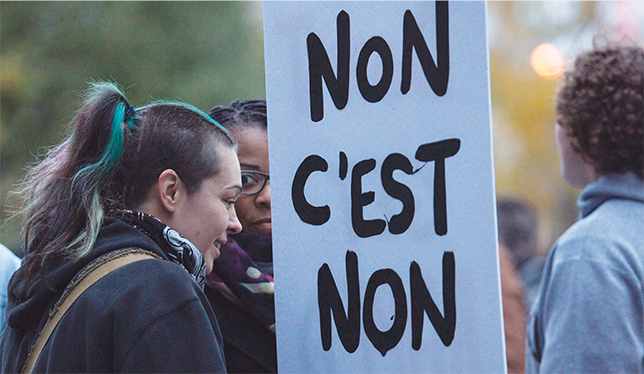Should sexual relations between professors and students be prohibited?
In Quebec, a new law calls for universities to adopt a code of conduct covering faculty-student relationships.

On December 8, the Quebec government passed Bill 151, an act aimed at preventing and combatting sexual violence on the province’s university and college campuses. Among other things, the new law mandates that universities and CEGEPs (Quebec’s colleges) develop standalone sexual violence policies. British Columbia, Manitoba and Ontario all passed similar legislation that came into effect during the past year.
However, Quebec’s new law has generated much discussion because it has a provision requiring postsecondary institutions to adopt policies governing intimate relationships between students and university personnel, including professors and lecturers. Quebec’s minister responsible for higher education and the status of women, Hélène David, said during public hearings on the bill that the government can’t ban such relationships. But, she said universities and CEGEPs would have the authority to do so.
The new law requires such policies to be adopted by September 1, 2019. Prior to the new law’s adoption, Jean-François Huppé, communications director at Université Laval, said his institution supports the legislation. “Its proposals are in line with … the desire of educational institutions to combat sexual violence more effectively. A number of measures are already in effect at Laval, and others will follow. We want to guarantee the well-being of students, staff members and the entire university community.”
Other parties are less enthusiastic. Sandrine Ricci, scientific coordinator for the Réseau québécois en études féministes (the Quebec network for feminist studies), said she was disappointed that the minister – despite her remarks – did not simply prohibit outright sexual relationships between faculty and students. “We maintain that relationships between students and people who are in a position to influence their progress, in terms of both their studies and employment in an academic environment, should be banned,” said Dr. Ricci.

There appears to be no Canadian university that currently bans sexual relations between faculty and students. In the spring of 2016, the interim president of the University of British Columbia, Martha Piper, instructed university officials to examine whether there should be such a ban, but nothing came of it. In the U.S., Harvard University’s faculty of arts and sciences did ban “sexual and romantic relationships” between faculty and undergraduate students in 2015, revising a policy which deemed such relationships to be “inappropriate.”
Most Canadian universities do offer at least some guidance on the matter. For example, McMaster University’s office of human rights and equity services suggests that: “To prevent creating a conflict of interest, instructors should remove themselves from positions of power over students prior to engaging in romantic or sexual relationships.” It directs instructors to the faculty association’s faculty handbook for further advice.
Neil McArthur, an associate professor of philosophy and director of the Centre for Professional and Applied Ethics at the University of Manitoba, wrote in a February 2017 paper in The Journal of Ethics and Education that there is relatively little data on the incidence of student-professor relationships. “This is not surprising, given the sensitivity of the issue, as well as the confidentiality that must surround any investigation by university administrators.” What studies do exist suggest that such relationships are “not uncommon.” Regardless, he argues that they should not be banned.
A survey on sexual relations on campus, conducted by a team of researchers from six Quebec universities, adds fuel to the debate. The Enquête Sexualité, Sécurité et Interactions en Milieu Universitaire, or ESSIMU, published its findings last winter. The survey found that more than a third of respondents (36.9 percent) had experienced some form of sexual violence in a university setting. Of that group, 30.3 percent reported a situation involving a person in a position of authority; over one quarter reported at least one incident involving a faculty member.
Two student groups, the Union étudiante du Québec and the Association pour la voix étudiante au Québec, support prohibition when there is a direct relationship of authority between a professor and a student – for example, when the professor is acting as a teacher, a supervisor or an employer.
“It is very difficult to tell whether the consent is real in cases like these,” said Simon Telles, UEQ president. “Another issue raised is the value of the teacher’s assessment and the equality of opportunities between students – for example, the awarding of research contracts.” Mr. Telles added that his group is concerned that allowing each university to adopt its own policy will create disparities between institutions in terms of protections for students and the remedies available to them in such situations.
Martine Delvaux, a professor of literature at Université du Québec à Montréal, has for several years publicly questioned the fairness of sexual relationships between professors and students. But, she said that she understands it is difficult for the minister and for university administrations to take a tough stand. Even some feminists argue against the adoption of a code of conduct, she said, arguing that this is patronizing to adult students who are capable of making their own decisions.
The “consenting adults” argument is often advanced by those who oppose a code of conduct. But Dr. Delvaux said she believes that “consent between two persons in such an obvious relationship of power is non-existent.” When a relationship of this type goes sour, she said, the more vulnerable partner, the student, is the one who suffers. Students who fall out with a thesis director, for example, can seriously jeopardize not only their academic success but also their career, because the director may also sit on editorial boards of academic journals, hiring committees and so on.
Jean-Marie Lafortune, president of the Fédération québécoise des professeures et professeurs d’université (Quebec federation of university teachers), said his organization is concerned about how a new code of conduct would be enforced. “Will we have morality police on campus to keep an eye on faculty? We risk creating a climate in which everyone feels they are being spied upon,” he said.
Perrine Argiles, spokesperson for the Association pour la voix étudiante au Québec, said her group worries that the debate about relations between faculty and students draws attention away from sexual violence between students. In the ESSIMU survey (PDF), 70 percent of those who had experienced a form of campus sexual violence reported that it involved a student. “Clearly, relationships between teachers and students have to be discussed, but let’s not forget that the perpetrators of sexual violence are students much more frequently than teachers,” Ms. Argiles said.
Featured Jobs
- Business – Lecturer or Assistant Professor, 2-year term (Strategic Management) McMaster University
- Canada Excellence Research Chair in Computational Social Science, AI, and Democracy (Associate or Full Professor)McGill University
- Veterinary Medicine - Faculty Position (Large Animal Internal Medicine) University of Saskatchewan
- Psychology - Assistant Professor (Speech-Language Pathology)University of Victoria















Post a comment
University Affairs moderates all comments according to the following guidelines. If approved, comments generally appear within one business day. We may republish particularly insightful remarks in our print edition or elsewhere.
5 Comments
Then all sexual relationships between colleagues should also be banned. We should enstate a morality police to ensure compliance.
The study reported sexual victimization, not sexual violence (although that term was in the title). Here’s what the 36.9% figure referred to: “The victimization scale distinguished sexual harassment (verbal and non-verbal behaviour that reflected insulting, hostile and degrading attitudes), unwanted sexual attention (offensive, unwanted and unreciprocated verbal and nonverbal behaviour, including attempted rape and sexual aggression) and sexual coercion (blackmail for favours).” I suspect many people would interpret “sexual violence” somewhat more narrowly than this range of behaviours.
Our university currently waives tuition to spouses and partners of faculty. They will at the same time be banning those relationships under Quebec’s new law.
I did not begin work on my Ph.D. in order to sleep with my students. I also worked in a traditional program and an adult degree program. And adult 32 year old person as a student vs a 18 year old is quite different. I would ban it though, too much of a slippery slope, too much going on right now and I don’t care about right or wrong, it just sends a bad massage.
Certainly when a faculty member is supervising a student in some way, whether teaching a class, acting as a thesis advisor, or overseeing students working in their lab, any sort of romantic or sexual relationship should be banned. The faculty member simply has too much control and influence over that student’s grades and career for the student to freely consent.
This does not mean there will be “morality police on campus to keep an eye on faculty” as Jean-Marie Lafortune fears. It means that if such a relationship occurs, or is attempted, the student can report this behavior to whatever ethics board already exists and there can be actual consequences for the faculty member, as they will have violated university policy. (Yes, the burden falls on faculty to control themselves–they are the ones with power in this situation, and if they can’t use that wisely, they do not deserve the position.)
For those who think this will somehow ruin what could be beautiful relationships: if two people are that much in love, they can find a way to sever the professional relationship. The student can take classes or be advised by a different professor, or the professor can work in a different capacity or at a different college. People make professional choices all the time based in part on their significant other’s career and family circumstances. This is no different.
As to Zaire’s comment that this will lead to a ban on relationships between coworkers: no, it won’t. Because coworkers do not have the power over each other that a professor has over a student. This is not a slippery slope issue, as the categories are entirely separate.
In summary: professors are professionals, and should keep their relationships with students professional (this can be warm, and even friendly, but there are lines you do not cross). If a professor fails in this capacity, they are failing as educators, and yes, there should be consequences.